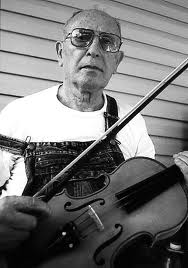Annotation:Puncheon Camps: Difference between revisions
No edit summary |
No edit summary |
||
| Line 2: | Line 2: | ||
---- | ---- | ||
<p><font face="garamond, serif" size="4"> | <p><font face="garamond, serif" size="4"> | ||
'''PUNCHEON CAMP(S).''' AKA and see "[[Kitty Puss]]," "[[Tucker's Old Barn]]," "[[Old Time Mockingbird]]." Old-Time, Breakdown. USA, eastern Ky. D Major. Standard tuning (fiddle). AABBCC. A puncheon floor is a floor made of logs split lengthwise which are pegged, flat side upward, to joists to make floors in log houses. A puncheon camp is generally thought to be the logging camp where loggers split the wood prior to delivering it. The third strain is irregular in Kentucky fiddle and banjo player Clyde Davenport's [https://fieldrecorder.org/clyde-davenport/] version (as transcribed in by Stacy Phillips), which can also be found in Buddy Thomas's (eastern Ky.) "[[Possum up a Simmon Tree (1)]]" [Ed. note: Stacy Phillips "Puncheon Camps", attributed to Clyde Davenport, is not the same tune as the "Puncheon Camps" played by Davenport on FRC 104--disambiguation needed]. Davenport's father, Will Davenport, played the tune on the fiddle, and Clyde himself plays it on both banjo and fiddle. Variants of the tune include Virgil Anderson's “[[Cold Nights a-Comin']]." | '''PUNCHEON CAMP(S).''' AKA and see "[[Kitty Puss]]," "[[Tucker's Old Barn]]," "[[Old Time Mockingbird]]." Old-Time, Breakdown. USA, eastern Ky. D Major. Standard tuning (fiddle). AABBCC. A puncheon floor is a floor made of logs split lengthwise which are pegged, flat side upward, to joists to make floors in log houses. A puncheon camp is generally thought to be the logging camp where loggers split the wood prior to delivering it. The third strain is irregular in Kentucky fiddle and banjo player Clyde Davenport's [https://fieldrecorder.org/clyde-davenport/] version (as transcribed in by Stacy Phillips), which can also be found in Buddy Thomas's (eastern Ky.) "[[Possum up a Simmon Tree (1)]]" [Ed. note: Stacy Phillips transcription of "Puncheon Camps", attributed to Clyde Davenport, is not the same tune as the "Puncheon Camps" played by Davenport on FRC 104--disambiguation needed]. Davenport's father, Will Davenport, played the tune on the fiddle, and Clyde himself plays it on both banjo and fiddle. Variants of the tune include Virgil Anderson's “[[Cold Nights a-Comin']]." | ||
<br> | <br> | ||
<br> | <br> | ||
Revision as of 03:00, 22 October 2018
Back to Puncheon Camps
PUNCHEON CAMP(S). AKA and see "Kitty Puss," "Tucker's Old Barn," "Old Time Mockingbird." Old-Time, Breakdown. USA, eastern Ky. D Major. Standard tuning (fiddle). AABBCC. A puncheon floor is a floor made of logs split lengthwise which are pegged, flat side upward, to joists to make floors in log houses. A puncheon camp is generally thought to be the logging camp where loggers split the wood prior to delivering it. The third strain is irregular in Kentucky fiddle and banjo player Clyde Davenport's [1] version (as transcribed in by Stacy Phillips), which can also be found in Buddy Thomas's (eastern Ky.) "Possum up a Simmon Tree (1)" [Ed. note: Stacy Phillips transcription of "Puncheon Camps", attributed to Clyde Davenport, is not the same tune as the "Puncheon Camps" played by Davenport on FRC 104--disambiguation needed]. Davenport's father, Will Davenport, played the tune on the fiddle, and Clyde himself plays it on both banjo and fiddle. Variants of the tune include Virgil Anderson's “Cold Nights a-Comin'."

Source for notated version: Clyde Davenport (b. 1921, Monticello, Ky.) [Phillips].
Printed sources: Perlman (Everything You Wanted to Know About Clawhammer Banjo), 2004; p. 13. Phillips (Traditional American Fiddle Tunes, vol. 1), 1994; p. 190 (related to "Five Miles from Town").
Recorded sources:
Field Recorder Collective FRC 104, "Clyde Davenport vol. 2" (2005).
Venerable Records, Andy Cahan – "Hits From the Mountains."
Appalachian Center Ser. AC002, Clyde Davenport – "Puncheon Camps" (1992).
See also listing at:
Hear/see the tune played in 1993 by Clyde Davenport on youtube.com [2]
Hear Davenport's recording at Slippery Hill [3] and at the Field Recorders Collective [4].
